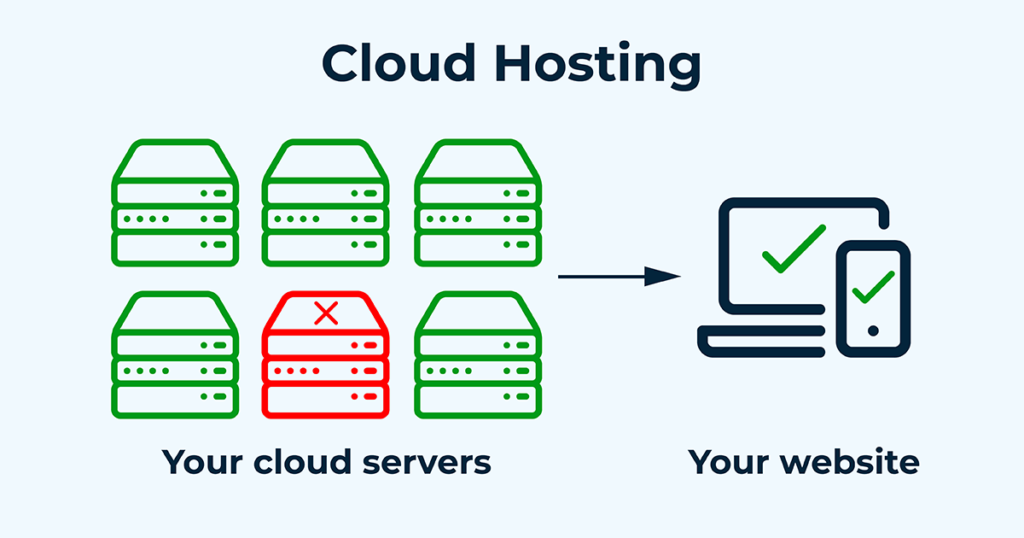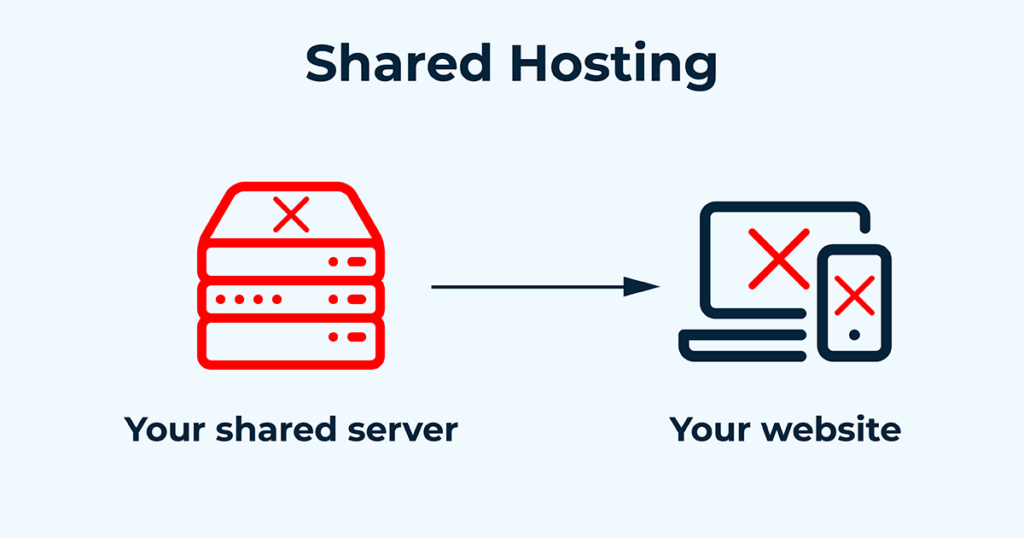Researching the different types of website hosting. Who has the time?
Yet you know uninformed decisions are more likely to be wrong and so end up taking more time. Not to mention the financial cost of rectifying mistakes.
To make matters worse, researching website hosting can be very confusing, especially if you’re new to website management. Although they try their best, most host providers can’t avoid writing in tech gibberish.
And that’s probably why you’re here – to understand the different types of website hosting available. Well, congratulations – you’re in the right place!
To make this easy we start with what we believe is the best choice of website hosting for most businesses and nonprofits today. If you’re happy to be guided by our hard-earned experience this is all you need.
In case you want to know more we explore other types of website hosting below. But as you will see, the cheap options often end up being more expensive, just as skipping research typically ends up taking more time.
So (drum roll), here is our recommendation for hosting your website:
Managed cloud hosting – Your best option from the different types of website hosting available
When all things are considered – cost, performance, security, reliability and ease of use – managed cloud hosting is the best website hosting type for most business and nonprofit websites today.
You can learn why your choice of website host matters later in this article. Right now, let’s see why managed cloud hosting is your best option.
Managed cloud hosting is actually a combination of two separate things – cloud hosting and managed hosting. Let’s start with cloud hosting.
Your website host provides the servers where your website lives. Other hosting options plonk your website on one data centre ideally located (if available) close to your audience (assuming your audience isn’t dispersed over a broad geographic area).
Cloud hosting takes a different approach.
With cloud hosting your website is housed on a global network of computers.
This brings two highly desirable advantages:
- Your website loads really quickly no matter where an audience member is located when accessing it
- A server error is less likely to result in your website being unavailable to your audience, as other servers in the network automatically step in

So, fast website load speeds at a time when website speed is crucially important to website success, and more uptime meaning less inconvenience for your audience and more customers, subscribers, donors etc for you.
Now, let’s look at managed hosting.
With managed hosting someone takes care of all the nerdy tech stuff involved in hosting a website for you, freeing your time to run your business or achieve your nonprofit goals.
Think of it this way. You don’t buy a car to service and repair it. You buy a car to get to work and visit friends and family (kudos to the handy few who maintain their own cars).
Likewise you don’t run a website to update servers and constantly respond to security issues. You run a website to achieve your website goals, like gaining new customers, subscribers and donors.
So it makes perfect sense to have someone take care of the time-consuming technical aspects of hosting a website, and that’s what managed hosting does for you.
So, that’s managed cloud hosting – fast, reliable, secure, set-and-forget website hosting.
Affordable Managed Cloud Hosting
Our cloud hosting is secure, reliable and really fast. It’s also fully managed, so you can focus on your goals and leave the nerdy tech stuff to us.
Ask about our 10% discount for approved nonprofits!
Other types of website hosting
The other types of website hosting that make sense for the majority of website owners to consider are shared hosting and VPS hosting.
Shared hosting
Shared hosting is the cheapest website hosting type available.
With shared hosting your website is placed on a single data centre where it competes for server resources with many other websites.
There are several problems with this approach.
First, if the server goes down your website also goes down, making it unavailable to your audience. This situation is far less likely to occur with cloud hosting that places your website on a global network of computers. Should one server go down other servers step in to keep your website live.

Second, one or more websites on your shared server experiencing a surge in traffic can result in insufficient server resources (CPU; memory; disk space; bandwidth) for your website to function optimally.
When this happens your website load speed is reduced and you may suffer website downtime (periods when your website is unavailable to your audience).
A third shared hosting disadvantage is the security risks.
The Coronavirus pandemic has taught us the value of social distancing. But on shared hosting many websites are bundled together, so one website catching a virus places all other websites on the server at risk of infection.
And to compound this problem, shared hosting security and backup features are not always as robust as you need them to be.
I’ll highlight this with a story.
The common wisdom for new website owners is to start with shared hosting and migrate to other hosting types as their website grows.
Way back in time when I was green and naive I did exactly this with my first website.
However, I didn’t eventually migrate to better hosting because my website grew. I migrated because my website was hacked.
You see, my shared host’s security wasn’t up to the task of protecting my website. Their backup system also wasn’t up to scratch, so I almost lost everything.
Any money I had saved by using shared hosting was lost several times over in the cost of cleaning up my site. Not to mention lost conversions while my website was down.
I learned the hard way so that you don’t have to. Now my advice for all website owners – both new and experienced for small websites and large – is to use managed cloud hosting.
The only reason to use shared hosting is that it is cheap. If you are financially constrained then go ahead.
However, be sure to take extra precautions with security and backups. There’s a lot you can do to improve website security on shared hosting, but start by adding security and backup plugins to your site rather than relying on anything provided by your host.
Another crucially important step for all websites no matter where they’re hosted is keeping up with website maintenance, as website run on outdated programs are an easy target for hackers.
Tip – If a shared host provider promises “unlimited” anything (e.g. websites; storage; bandwidth) check the small print. You’ll probably find their definition of unlimited is limited by a “fair use” policy.
VPS hosting
Virtual private server (VPS) hosting is similar to shared hosting except software is used to partition the server into many virtual servers. Your website is then hosted on one of these virtual servers.
VPS hosting is also similar to shared hosting in that it places your website at one location. When that data centre experiences problems your website will be unavailable to your audience.
Further, audience members accessing your website from locations distant from your server’s physical location will have to wait longer for your website to load.
Cloud hosting solves these problems by housing your website on a global network of data centres.
VPS hosting used to be popular with website owners wanting to move up from shared hosting. However, today most owners find they’re better off with cloud hosting.
Does my choice of website host matter?
Make no mistake – your choice of website host matters a great deal.
Your website host will play a major role in your website’s success (or failure) with impacts felt by your users and yourself as website owner.
Following are the main ways in which your choice of website host affects your website’s success:
Performance
Your host’s role in website performance mostly comes down to website load speed – the time a user must wait between clicking on a link to a page on your website to being able to interact with that page.
Website load speed plays many crucial roles in website success, from ensuring a good user experience to improving your position in Google search results and achieving more conversions (e.g. sales; subscribes; donations).
There are many optimisations you can make to improve website load speed, but the biggest leap in speed for many websites is achieved simply by moving to a faster host.
Security
Do not take website security lightly! There are people out there who want to hack your website, either for financial gain or just for pure vandalism.
Brute force attacks, malware infections, DDoS attacks – you’ll be surprised what these people are capable of (makes you wonder how much better the world would be if they used their powers for good rather than evil).
Most website hosts offer some security protection, but, same as everything in this world, you get what you pay for. So when comparing the cost of the different types of website hosting add some extra dollars for additional security and backup plugins to the price of shared hosting.
Reliability
The visible cost of website downtime is measured in lost customers, subscribers and donors. The invisible cost is measured in lost trust in your organisation among frustrated users wanting to access your website.
Websites hosted on a single server suffer more downtime than websites hosted on a network of servers in the cloud.
When a single shared host or VPS host server goes down all websites on the server go down with it until the problem is fixed.
When a cloud host server goes down other servers in the network step in to fill the gap. Most of the time this happens faster than the blink of an eye. Result, more website uptime and happy website users.
Ease of use
This is all about how much time you want to put into managing your website. In placing a value on this feature of website hosting consider where your time is best spent.
Is it best spent running your business or nonprofit – developing new products, services or campaigns; building new relationships; caring for your clients and supporters; finding new clients and supporters?
Or is it best spent learning new and complex technical skills unrelated to achieving your business or nonprofit goals, like maintaining and updating servers, keeping up with security threats, and establishing and maintaining a rigorous backup schedule?
Managed hosting takes care of all of this for you. It really is a no-brainer.
To understand the many features offered by website hosting companies and learn the features you do and do not need, check out our plain language guide to website hosting features.
Choosing from the different types of website hosting conclusion
Choosing your website host type is an important decision that affects website performance, security, reliability and ease of use. Taking these things into consideration you are strongly recommended to use managed cloud hosting, including for small and/or new websites.
Affordable Managed Cloud Hosting
Our cloud hosting is secure, reliable and really fast. It’s also fully managed, so you can focus on your goals and leave the nerdy tech stuff to us.
Ask about our 10% discount for approved nonprofits!